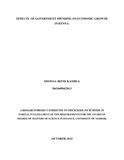| dc.description.abstract | Government spending can be defined as any expenditure made by local, regional, and national
governments making up a considerable portion of the Gross National Product. Government
spending can be financed by government borrowing or taxes. The expenditure is vital for the
efficient running of the economy. The need for much of the government expenditure arises from
the fact that some goods cannot be provided at all by a free market economy and that others may
be under-provided. It is expenditure on merit goods such as health, education, police and
defense, among others that accounts for a large proportion of government spending. Economic
growth represents the expansion of a country’s potential GDP or output. When the economy is
growing positively, businesses will need to hire more people to help to cope with the increase in
production and services and consequently leading to Economic growth which reflects the
standard of living of a country. Although Kenya is one of the fastest growing economies in East
and Central Africa, its economy still depends heavily on the agriculture sector. The Kenyan
government uses a number of regulatory bodies to regulate the economic development. These
bodies include; the Central Bank of Kenya and The Capital Markets Authority which are not
always effective in measuring growth and formulating policies towards its development. The
objective of this study was to determine the effect of government expenditure on economic
growth in Kenya. The study was descriptive in nature and involved quantitative analysis of data
which employed Secondary data to analyze the effect of government expenditure on economic
growth in Kenya. Data for economic growth was obtained from World Bank and IMF data bank
from 2007 to 2012 where by the Data for government spending on health, infrastructure, security
and education was converted into calendar years since economic growth obtained were in
calendar year. Granger Causality Test was used to determine whether one time series is useful in
forecasting another (Enders, 1995). The VAR equations were used to perform Granger causality
tests. The study findings indicated that; there is a significant influence of the government
spending on education, infrastructure, health and defense. Thus it has been recommended that;
Education spending should be linked to resource needs (both human and capital) both at subnational
and facility levels. The Government should emphasize infrastructure development to
reduce the cost of doing business and enhance efficiency in service delivery to accelerate
development. The government should be committed to improving access and equity of essential
health care services by setting critical and ambitious targets for providing health services to the
citizens as well that In order to achieve the national goals and objectives, provision of security to
the country is critical. | en_US |

